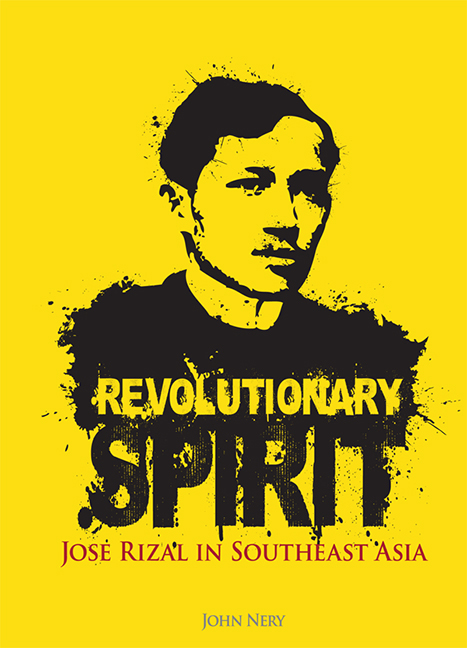Book contents
- Frontmatter
- Dedication
- Epigraph
- Contents
- Foreword
- Message
- Preface
- Acknowledgements
- INTRODUCTION The Uses of Error A Rizal Chronology
- 1 TURNING POINTS
- 2 “THE VERY SOUL OF THIS REBELLION”
- 3 DOCTOR RIZAL
- 4 “HALFBLOED”
- 5 “NO MARX OR LENIN”
- 6 UNDER THE SOUTHERN SUN
- 7 THE HOPE OF MILLIONS IN ASIA
- 8 “HIS NAME IS SWEET IN OUR MEMORY”
- 9 THE MYTH BUSTERS
- 10 “A GREAT HISTORICAL EXPERIMENT”
- Epilogue
- Appendices
- References
- Index
- Frontmatter
- Dedication
- Epigraph
- Contents
- Foreword
- Message
- Preface
- Acknowledgements
- INTRODUCTION The Uses of Error A Rizal Chronology
- 1 TURNING POINTS
- 2 “THE VERY SOUL OF THIS REBELLION”
- 3 DOCTOR RIZAL
- 4 “HALFBLOED”
- 5 “NO MARX OR LENIN”
- 6 UNDER THE SOUTHERN SUN
- 7 THE HOPE OF MILLIONS IN ASIA
- 8 “HIS NAME IS SWEET IN OUR MEMORY”
- 9 THE MYTH BUSTERS
- 10 “A GREAT HISTORICAL EXPERIMENT”
- Epilogue
- Appendices
- References
- Index
Summary
Every now and then it is said in the Philippines that national hero Jose Rizal influenced the course of the revolution in neighbouring Indonesia. A statement by former vice president Salvador Laurel, chairman of the Philippine Centennial Commission in the 1990s, may be taken as emblematic. Speaking at the Jakarta International Conference on the Centenary of the Philippine Revolution and the First Asian Republic in 1997, Laurel said: “Historians recount that Rizal's death and immortal poem, ‘Mi Ultimo Adios,’ translated into Bahasa Indonesia, inspired the Indonesian revolution.”
It is a problematic statement, because certain terms demand an explanation. Which historians does Laurel mean? How does he define inspiration? It can be, strictly speaking, misleading. The Indonesian revolution, which began in 1945, did not depend on an acquaintance with Rizal or his poem. And yet it is truthful too. Journalist and occasional historian Rosihan Anwar argued the case as far back as 1961: Rizal's example and his exemplary poem were an inspiration for many in the revolutionary generation. The repeated experience of revolutionary pemuda claiming the translation as their own, in 1944 in Jakarta, in 1945 in Surabaya, in 1946 in Mojokerto, shows that, at least in Java, Indonesian nationalists at a moment of real peril had taken inspiration from a stirring poem that promised a useful, even glorious martyrdom.
It is in this last, nuanced sense that we can say that Rizal's influence in Southeast Asia outside the Philippines was real. It was both a part of the general background (in the exact same sense that Philippine “people power” was very much in the air in the late 1980s, seeping even through the cracks in the Iron Curtain), and specific to both time and place.
Rizal's impact was strongest in the Indonesian nationalist awakening. By the second decade of the twentieth century, a pioneer nationalist, the Eurasian E. F. E. Douwes Dekker, had embraced Rizal's work and example. It is a matter of debate whether Douwes Dekker's writings reached a broad public, but there is no doubt that, during a crisis in the emergence of Indonesian nationalism, he found Rizal congenial to his cause. He would eventually outgrow the notion of an independence movement led by mestizos like him, but it was Rizal who informed that transitional phase.
- Type
- Chapter
- Information
- Revolutionary SpiritJose Rizal in Southeast Asia, pp. 231 - 234Publisher: ISEAS–Yusof Ishak InstitutePrint publication year: 2011



